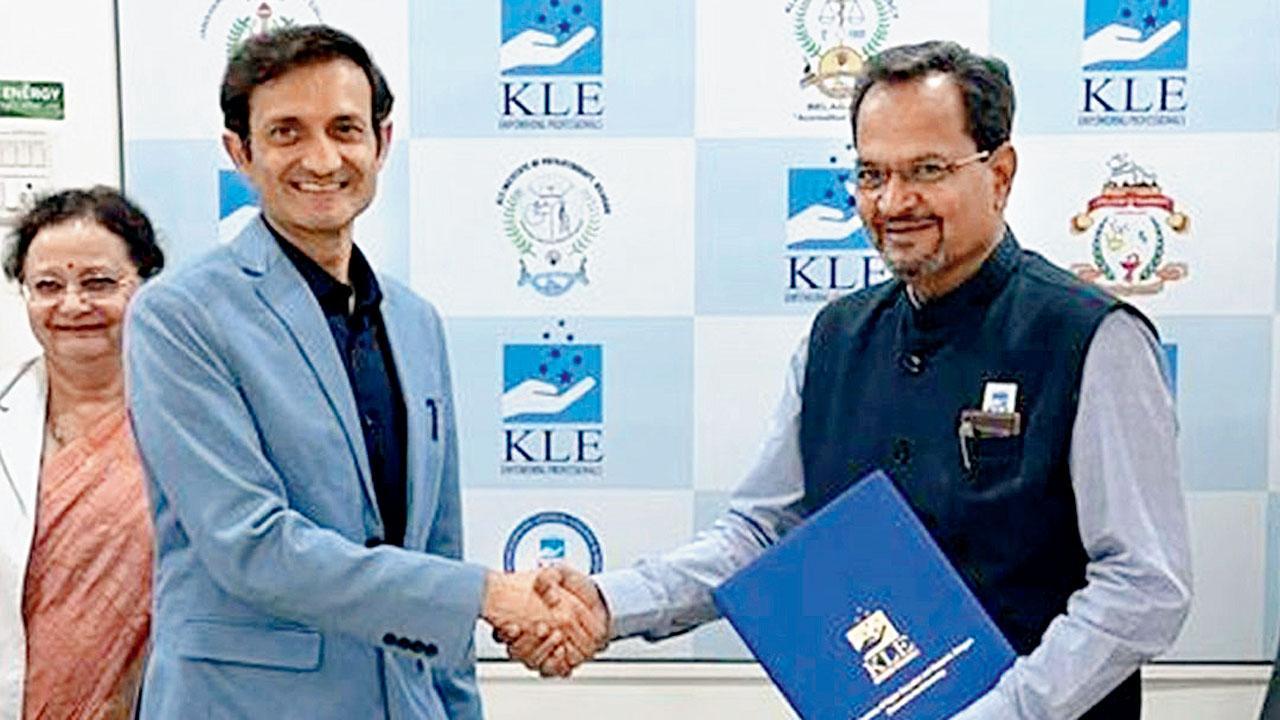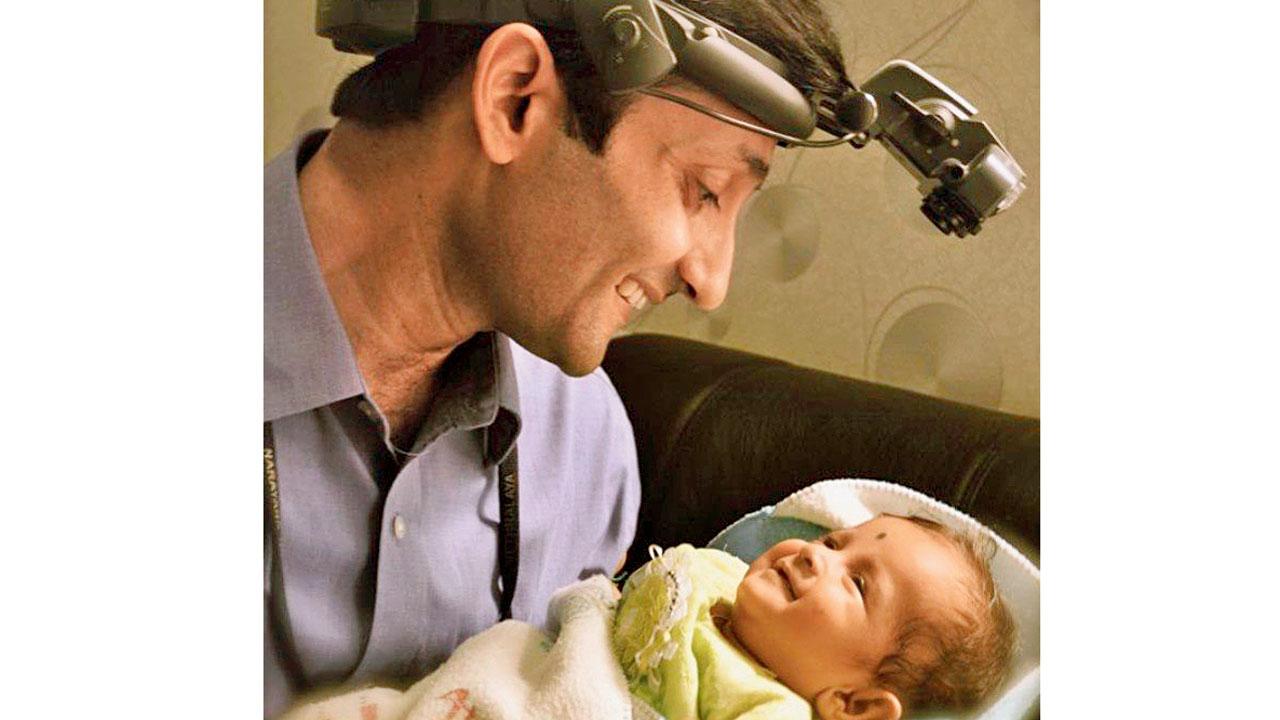Doctors call on fellow professionals, NGOs and the government to learn from previous successful campaigns, devise cost-effective technologies for remote screening of preterm newborns to prevent vision loss

Narayana Nethralaya’s KIDROP signed an MOU with the KAHER and Jawaharlal Nehru Medical College, Belagavi
While the Indian Retinopathy of Prematurity Society has launched a mission to protect the vision of preterm babies, an article published in the Lancet Regional Health Southeast Asia in May has suggested a comprehensive approach that draws on lessons from the successful Global Polio Eradication Initiative (GPEI) to tackle ROP in India.
The article, ‘Retinopathy of prematurity in India: what we can learn from the polio legacy’, sheds light on the challenges of tackling ROP in India, which sees over 3.5 million preterm births annually. It is authored by Dr Sam Athikarisamy and Dr Sanjay Patole from the University of Western Australia, Perth, and Dr Anand Vinekar of Narayana Nethralaya, Bangalore, and the founder and director of KIDROP (Karnataka Internet-assisted Diagnosis of ROP). In a November 18 report, mid-day outlined the risk of vision loss faced by preterm newborns.

Eye surgeon Dr Anand Vinekar co-authored the article on Retinopathy of Prematurity (ROP) which was published in Lancet Southeast Asia in May
The Lancet article emphasises the impact of untreated ROP and proposes primary prevention measures like reducing preterm births, improving neonatal practices, and ensuring proper oxygen stewardship. It also calls for more commitment and coordination from the government, NGOs, healthcare professionals including obstetricians, paediatricians, neonatologists, and ophthalmologists and professional organisations.
The article highlights the role influential brand ambassadors can play in creating awareness about ROP. It cites the example of the campaign against polio in India, which roped in actor Amitabh Bachchan. The article suggests ‘task shifting’ to create a suitable workforce, as there are not enough ophthalmologists trained in ROP management in the country. This model has been validated by KIDROP wherein non-physicians have been trained to image and triage infants in rural outreach neonatal ICUs.
Dr Vinekar envisions the future of ROP screening in India as a universal and standardised program led by paediatricians and neonatologists using innovative technologies, telemedicine, low-cost infant imaging cameras and artificial intelligence. “With trained technicians and an accredited reading centre, remote screening sites can receive credible diagnoses, leading to timely interventions to prevent severe vision loss and blindness,” Dr Vinekar said.
The KIDROP model
Narayana Nethralaya’s KIDROP is a tele-ROP service developed in Bangalore, which uses nonphysician imaging staff for ROP screening and providing treatment in places lacking specialists. Trained imaging staff capture and interpret retinal images using a triaging algorithm, and ROP-trained ophthalmologists review the images to provide reports and management decisions within 20 minutes. The model enables rural families to access ROP specialists remotely.
A public-private partnership with the Karnataka government, KIDROP is currently one of the largest single-centre ROP programs in the world, having tie-ups with 152 NICUs. Implemented across Karnataka, the model has trained and mentored institutes nationally and internationally. “So far, more than 2,20,000 screenings have been completed and over 4,000 babies have been treated. An economic impact study has found that the implementation of this model in other states with similar demographics could save over $100 million annually in blindness-related costs,” said Dr Vinekar.
On November 17 (World Prematurity Day), the KIDROP programme signed an MOU with the KLE Academy of Higher Education and Research (KAHER) and Jawaharlal Nehru Medical College, Belagavi to expand the model in the district and to initiate screening in southern Maharashtra and Goa.
Risk factors for ROP
According to Dr Vinekar, a baby’s retinal vessels begin to grow intrauterine and complete only if the baby is born on or near the due date. Premature birth means the development of the retina remains incomplete. There is a risk of blood vessels that supply oxygen to the eyes not growing normally, which can lead to ROP. “Other than premature birth (at 34 weeks of gestation) and low birth weight (less than 2 kg), other risks for these babies include the prolonged use of oxygen (for their lungs), sepsis, blood transfusion, jaundice, low weight gain, low platelets, anaemia, intraventricular haemorrhage, etc,” said Dr Vinekar. ROP screening within 30 days of birth and before being discharged is strongly recommended for prevention.
Lack of visible symptoms
According to Dr Vinekar, there are no visible external signs of ROP when it first develops. “As a result, many parents do not get their babies screened on time. In advanced stages, there is a white reflex (leukocoria) at the centre of the pupil (round black portion of the eye). By the time there are signs (at four to six weeks), it is too late to save useful vision. An untreated infant with advanced ROP will have poor vision, poor eye contact with the parent, abnormal shaking of the eyes (nystagmus), and often delayed milestones,” Dr Vinekar said. “Subtle and early treatable changes in a baby’s retina can only be detected by a trained ROP specialist and better documented by widefield retinal imaging using special cameras,” Dr Vinekar said.
 Subscribe today by clicking the link and stay updated with the latest news!" Click here!
Subscribe today by clicking the link and stay updated with the latest news!" Click here!










